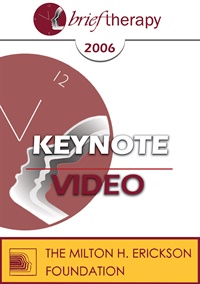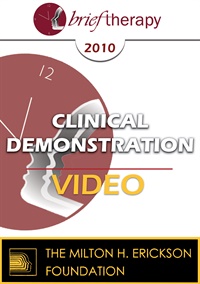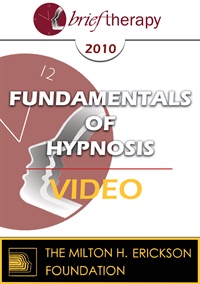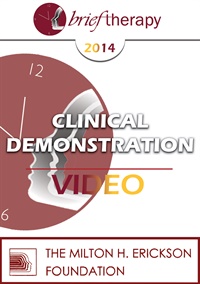
- Average Rating:
- Not yet rated
- Topic Areas:
- Topical Panels | Art and Creativity | Psychotherapy | Brief Therapy | Neuroscience
- Categories:
- Brief Therapy Conference | Brief Therapy Conference 2002
- Faculty:
- Steve Andreas, MA, NLP | Albert Ellis, PhD | Scott Miller, PhD
- Duration:
- 58:57
- Format:
- Audio Only
- Original Program Date:
- Dec 13, 2002
- Short Description:
- This topical panel tackles the long-running question of whether psychotherapy is best understood as an art, a science, or something closer to belief and persuasion. Through lively debate and contrasting viewpoints, it explores evidence, technique, therapist influence, and client change, offering a candid look at why different approaches often work, even when their theories sharply disagree.
- Price:
- $15.00 - Base Price
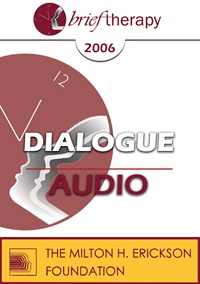
- Average Rating:
- Not yet rated
- Topic Areas:
- Dialogues | Brief Therapy | Neuroscience
- Categories:
- Brief Therapy Conference | Brief Therapy Conference 2006
- Faculty:
- Pat Love, EdD | Ernest Rossi, PhD
- Duration:
- 1:01:43
- Format:
- Audio Only
- Original Program Date:
- Dec 08, 2006
- Short Description:
- BT06 Dialogue 03 - Role of Neurophysiology in Brief Therapy - Pat Love, EdD and Ernest Rossi, PhD
- Price:
- $15.00 - Base Price
- Average Rating:
- Not yet rated
- Topic Areas:
- Keynotes | Brief Therapy | Mind-Body | Psychotherapy | Neuroscience
- Categories:
- Brief Therapy Conference | Brief Therapy Conference 2006
- Faculty:
- Daniel Siegel, MD
- Course Levels:
- Master Degree or Higher in Health-Related Field
- Duration:
- 1:01:01
- Format:
- Audio and Video
- Original Program Date:
- Dec 07, 2006
- Short Description:
- This keynote address will provide an overview of the interdisciplinary view of the mind and mental health. Over 60,000 mental health providers have been asked about their formal education in these areas and less than 5% have had seminars defining these two basic aspects of psychotherapy. This presentation will offer a view based on science of the definition of the mind and well-being and explore ways in which brief therapy can foster rapid and lasting change.
- Price:
-
Sale is $29.00
price reduced from Base Price - $59.00
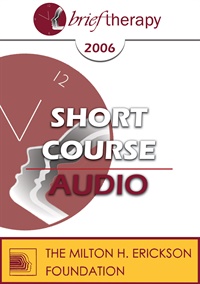
- Average Rating:
- Not yet rated
- Topic Areas:
- Short Courses | Affect | Attachment | Couples Therapy | Neuroscience
- Categories:
- Brief Therapy Conference | Brief Therapy Conference 2006
- Faculty:
- Marion Solomon, PhD
- Duration:
- 1:18:43
- Format:
- Audio Only
- Original Program Date:
- Dec 07, 2006
- Short Description:
- Participants in this workshop will explore ways to apply the understanding of attachment, trauma, brain and mind in diagnosing and treating relationship problems. A goal of the treatment is to accelerate the access to emotions in the more withdrawn partner, leading to more open communication between partners. Lecture, discussion and videotape demonstration will clarify how traumas of early disturbed bonding experiences can be seen and treated in a conjoint session.
- Price:
- $15.00 - Base Price
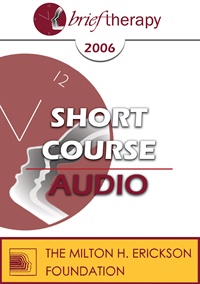
- Average Rating:
- Not yet rated
- Topic Areas:
- Short Courses | Borderline | Brief Therapy | Mind-Body | Neuroscience | Couples Therapy | Narcissism
- Categories:
- Brief Therapy Conference | Brief Therapy Conference 2006
- Faculty:
- Bruce Gregory, PhD
- Duration:
- 1:19:30
- Format:
- Audio Only
- Original Program Date:
- Dec 07, 2006
- Short Description:
- Dealing with narcissistic and borderline defenses that block healthy relating can be quite challenging when dealing with couples. This short course will address ways to creatively apply core aspects of Rossi's mind-body approach to develop treatment plans and interventions that can facilitate the containment of these defenses and help reorganize the dynamics of the couple system. The integration of the psychodynamic system and cognitive behavioral perspectives will be addresses throughout the course.
- Price:
- $15.00 - Base Price
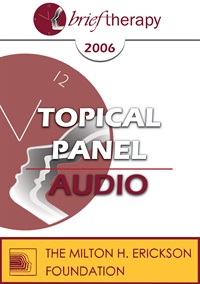
- Average Rating:
- Not yet rated
- Topic Areas:
- Topical Panels | Therapist Development | Clinical Psychology | Neuroscience
- Categories:
- Brief Therapy Conference | Brief Therapy Conference 2006 | Pioneers in Couples and Family Therapy
- Faculty:
- Ellyn Bader, PhD | Jeffrey Kottler, PhD | John C. Norcross, PhD | Ernest Rossi, PhD
- Duration:
- 56:31
- Format:
- Audio Only
- Original Program Date:
- Dec 08, 2006
- Short Description:
- A panel of expert therapists explores the critical role of the therapist's personal qualities in effective psychotherapy, revealing how authentic relationships, empathy, and self-development are key to therapeutic success. Panelists share personal stories and research demonstrating that the therapist's presence and connection often matter more than specific treatment techniques.
- Price:
- $15.00 - Base Price
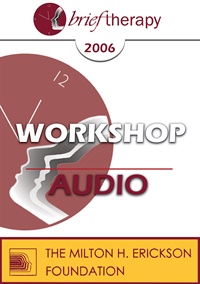
- Average Rating:
- Not yet rated
- Topic Areas:
- Workshops | Neurobiology | Brief Therapy | Neuroscience
- Categories:
- Brief Therapy Conference | Brief Therapy Conference 2006
- Faculty:
- Daniel Siegel, MD
- Duration:
- 2:38:28
- Format:
- Audio Only
- Original Program Date:
- Dec 07, 2006
- Short Description:
- This workshop will expand on the premise of the keynote by more deeply exploring a working definition of the mind and mental health. At the core of this approach is the role of neural integration in developing a flexible, adaptive, coherent, energized and stable state flow of the mind. This FACES state enables the clinician to feel the pulse of wellbeing as moving between the extremes of rigidity and chaos.
- Price:
- $15.00 - Base Price
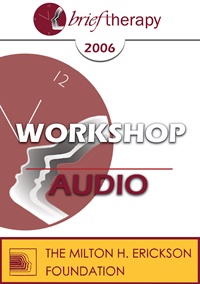
- Average Rating:
- Not yet rated
- Topic Areas:
- Workshops | Neuroscience | Psychotherapy | Brief Therapy | Mind-Body | Four-Stage Creative Process | Art and Creativity
- Categories:
- Brief Therapy Conference | Brief Therapy Conference 2006
- Faculty:
- Ernest Rossi, PhD
- Duration:
- 2:08:18
- Format:
- Audio Only
- Original Program Date:
- Dec 07, 2006
- Short Description:
- An introductory presentation reviewing how our daily mental activity may turn on the activity-dependent gene expression and protein synthesis cycle to construct and reconstruct the neural networks of our mind-brain and facilitate healing of the body. We will explore innovative approaches to facilitating the four-stage creative process in therapeutic hypnosis and psychotherapy in a group process and individual demonstrations.
- Price:
- $15.00 - Base Price
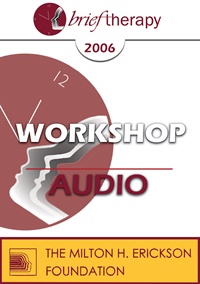
- Average Rating:
- Not yet rated
- Topic Areas:
- Workshops | Neuroscience | Psychotherapy | Brief Therapy | Transference / Countertransference | Consciousness
- Categories:
- Brief Therapy Conference | Brief Therapy Conference 2006
- Faculty:
- Ernest Rossi, PhD
- Duration:
- 2:31:00
- Format:
- Audio Only
- Original Program Date:
- Dec 09, 2006
- Short Description:
- Recent neuroscience research suggests that empathy, rapport and transference may be mediated by our mirror neurons. this new view of the basic talent of all psychotherapists will be explored during group processes and individual demonstrations utilizing Rossi's innovative approaches to therapeutic hypnosis and psychotherapy.
- Price:
- $15.00 - Base Price
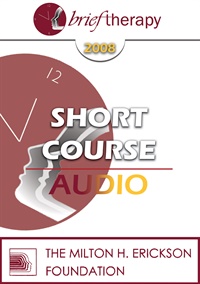
- Average Rating:
- Not yet rated
- Topic Areas:
- Short Courses | Brief Therapy | Neuroscience | Psychotherapy
- Categories:
- Brief Therapy Conference | Brief Therapy Conference 2008
- Faculty:
- Richard Hill, MBMSc, MEd, MA
- Duration:
- 1:33:24
- Format:
- Audio Only
- Original Program Date:
- Dec 11, 2008
- Short Description:
- Recent knowledge breakthroughs in neuroscience and neurophysiology explain why stress and anxiety are increasing despite enormous developments in psychotherapy. The work of Daniel Siegel, Ernest Rossi, Stephen Porges, Aronson & Steele and Jonathan Haidt act as pieces of a puzzle that explain why therapy can fail; and how this "winner/loser world" mindset is an unseen barrier to our more natural creative, interpersonal processes. A new world view is presented that can act as a lasting, transformational brief therapy.
- Price:
- $15.00 - Base Price
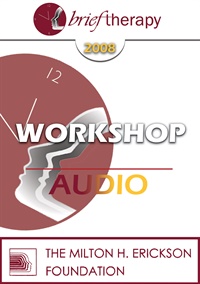
- Average Rating:
- Not yet rated
- Topic Areas:
- Workshops | Brief Therapy | Hypnosis | Neuroscience
- Categories:
- Brief Therapy Conference | Brief Therapy Conference 2008
- Faculty:
- Ernest Rossi, PhD
- Duration:
- 2:30:48
- Format:
- Audio Only
- Original Program Date:
- Dec 12, 2008
- Short Description:
- This workshop is an introductory presentation about how our daily mental activity turns on the activity-dependent gene expression and protein synthesis cycle to construct and reconstruct the neural networks of our brain. We will experience the four-stage creative process of art, science and psychotherapy during a group induction of therapeutic hypnosis.
- Price:
- $15.00 - Base Price
- Average Rating:
- Not yet rated
- Topic Areas:
- Clinical Demonstrations | Psychotherapy | Brief Therapy | Neuroscience
- Categories:
- Brief Therapy Conference | Brief Therapy Conference 2010
- Faculty:
- Ernest Rossi, PhD
- Course Levels:
- Master Degree or Higher in Health-Related Field
- Duration:
- 1:00:56
- Format:
- Audio and Video
- Original Program Date:
- Dec 11, 2010
- Short Description:
- A new, easy-to-learn 20 minute protocol for facilitating the ideo-plastic faculty of therapeutic hypnosis and brief psychotherapy. It is neuroscience evidence-based process for facilitating problem solving via (1) Optimized gene expression, (2) Reduced cellular oxidation, & (3) Reduced inflammation.
- Price:
-
Sale is $29.00
price reduced from Base Price - $59.00
- Average Rating:
- Not yet rated
- Topic Areas:
- Hypnosis | Fundamentals of Hypnosis | Neuroscience
- Categories:
- Brief Therapy Conference | Brief Therapy Conference 2010
- Faculty:
- Ernest Rossi, PhD
- Course Levels:
- Master Degree or Higher in Health-Related Field
- Duration:
- 2:43:01
- Format:
- Audio and Video
- Original Program Date:
- Dec 12, 2010
- Short Description:
- Revolutionary research in neuroscience documents how experiences of (1) Novelty, (2) Environment Enrichment, and (3) Mental & Physical Exercise can optimize gene expression, brain plasticity (brain growth), and mind-body healing. We will learn how to use our highest and most inspired states of consciousness to facilitate optimal gene expression and brain plasticity while healing stress and trauma.
- Price:
- $29.00 - Base Price
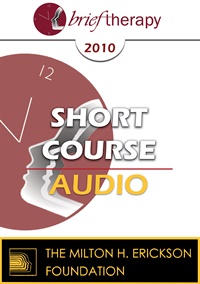
- Average Rating:
- Not yet rated
- Topic Areas:
- Neuroscience | Short Courses | Neurobiology | Brief Therapy | Mind-Body
- Categories:
- Brief Therapy Conference | Brief Therapy Conference 2010
- Faculty:
- Richard Hill, MBMSc, MEd, MA
- Duration:
- 1:30:17
- Format:
- Audio Only
- Original Program Date:
- Dec 09, 2010
- Short Description:
- Breakthroughs in neuroscience and neurophysiology explain how a mindset can alter what is turned on and turned off in the brain and the body. The work of Siegel, Rossi, Bandura, Aronson & Steele and Deci & Ryan act as pieces of a puzzle that explain why therapy can be disrupted by an imposed mindset and how this “winner/loser world” mindset is an unseen barrier to our more natural, creative, interpersonal process. A new, simple brief therapy is presented for lasting, transformational change.
- Price:
- $15.00 - Base Price

- Average Rating:
- Not yet rated
- Topic Areas:
- Trance | Short Courses | Art and Creativity | Brief Therapy | Neuroscience
- Categories:
- Brief Therapy Conference | Brief Therapy Conference 2010
- Faculty:
- Betty Blue, PhD
- Duration:
- 1:08:53
- Format:
- Audio Only
- Original Program Date:
- Dec 09, 2010
- Short Description:
- Play is more than lightness, it is a neurobiological intervention. In this lively and research-informed session, Betty Blue connects interactive playfulness with trance, mirror neurons, oxytocin, stress reduction, immune function, and neuroplasticity. Blending humor, experiential exercises, primate research, and clinical stories, she demonstrates how deliberate play can loosen rigid patterns, deepen empathy, and help clients transcend suffering while strengthening connection and resilience.
- Price:
- $15.00 - Base Price
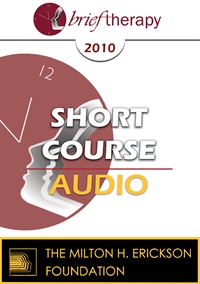
- Average Rating:
- Not yet rated
- Topic Areas:
- Couples Therapy | Short Courses | Gestalt | Intimacy | Relationships | Neurobiology | Neuroscience
- Categories:
- Brief Therapy Conference | Brief Therapy Conference 2010
- Faculty:
- Roberta Karant, PhD | Stefan Deutsch
- Duration:
- 1:33:35
- Format:
- Audio Only
- Original Program Date:
- Dec 09, 2010
- Short Description:
- Couples in distress minimize and numb their pain by avoiding contact. By writing a vision of what they both want, the therapist can focus the couple on the future. By combining Gestalt concepts with those popularized by Hendrix and others, therapists can have a powerful effect on quickening the healing process. New sessions will involve writing, note taking, and an agreed upon assignment to be practiced during the week. With Roberta Karant and Stefan Deutsch.
- Price:
- $15.00 - Base Price
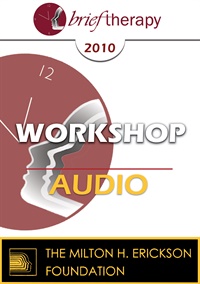
- Average Rating:
- Not yet rated
- Topic Areas:
- Attachment | Couples Therapy | Neuroscience | Workshops | Developmental Therapy Model | Differentiation
- Categories:
- Brief Therapy Conference | Brief Therapy Conference 2010 | Pioneers in Couples and Family Therapy
- Faculty:
- Ellyn Bader, PhD
- Duration:
- 1:54:30
- Format:
- Audio Only
- Original Program Date:
- Dec 12, 2010
- Short Description:
- The workshop delves into couples therapy by integrating attachment theory, differentiation, and neuroscience. Participants learn about relationship developmental stages, attachment styles, and conflict resolution techniques like the "ouch" method. The session explores challenges with different couple types, gender dynamics, and personal histories, using case studies to demonstrate how self-disclosure, addressing unresolved issues, and differentiation-based approaches can help couples develop deeper emotional connections and personal growth.
- Price:
- $15.00 - Base Price
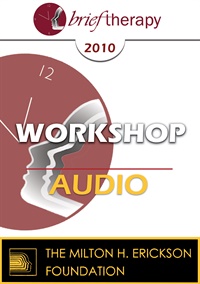
- Average Rating:
- Not yet rated
- Topic Areas:
- Hypnosis | Neuroscience | Psychotherapy | Workshops
- Categories:
- Brief Therapy Conference | Brief Therapy Conference 2010
- Faculty:
- Ernest Rossi, PhD
- Duration:
- 2:33:32
- Format:
- Audio Only
- Original Program Date:
- Dec 12, 2010
- Short Description:
- BT10 Workshop 38 - What Makes Us Human? The New Neuroscience of Therapeutic Hypnosis & Psychotherapy - Ernest Rossi, PhD Live demonstrations of “The Creative Psychosocial Genomic Healing Experience,” our new, easy-to-learn 20 minute protocol for facilitating the ideo-plastic faculty of therapeutic hypnosis & brief psychotherapy. Why bust your chops trying to make sense of the old, out-of-date Stanford and Harvard Hypnotic Susceptibility Scales that never were appropriate for optimizing “What makes us human?”
- Price:
- $15.00 - Base Price
Tags: Hypnosis Neuroscience
- Average Rating:
- Not yet rated
- Topic Areas:
- Addiction | Neuroscience | Keynotes
- Categories:
- Brief Therapy Conference | Brief Therapy Conference 2012
- Faculty:
- Patrick Carnes, PhD, CAS
- Duration:
- 1:07:07
- Format:
- Audio Only
- Original Program Date:
- Dec 08, 2012
- Short Description:
- BT12 Keynote 04 – Bargains with Chaos: Challenges and Choices – Patrick Carnes, PhD, CAS We witness a continuous parade of stars, financial gurus, clergy, politicians and athletes who enter rehabs sometimes repetitively. Is this about media coverage or are these elite canaries in the coal mines of our culture signifying a greater danger? Our understanding of addictions with the aid of neuroscience is expanding dramatically. With it is the realization of cultural and scientific shifts which underline the therapist’s role in facing our number one public health problem. One of the gifts of this challenge is our growth in technology which will transform what every therapist does for a living and maybe how humans evolve. But maybe we professionals are like the famous—reluctant to face difficult realities.
- Price:
- $15.00 - Base Price
Tags: Addiction Neuroscience
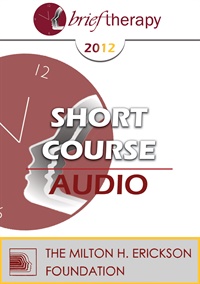
- Average Rating:
- Not yet rated
- Topic Areas:
- Trance | Neuroscience | Psychotherapy | Short Courses
- Categories:
- Brief Therapy Conference | Brief Therapy Conference 2012
- Faculty:
- Susan Pinco, PhD
- Duration:
- 1:13:42
- Format:
- Audio Only
- Original Program Date:
- Dec 09, 2012
- Short Description:
- BT12 Short Course 47 – Is it the Talking that Cures? An Exploration of the Role of Silence and Words in the Clinical Encounter – Susan Pinco, PhD Explore the role that silence plays in the hypnotic and clinical process. Our journey will begin with a discussion of structured and unstructured silence, how both are manifested, and potentially utilized. It continues with an overview of research related to silence in psychotherapy as well as findings in neuroscience that help explain why silence is a key ingredient in effective trance-formational processes. Attendees will engage in exercises that are designed to expand their awareness of the pivotal role that silence plays in healing and in so doing facilitate the conscious development of strategic interventions that utilize silence hypnotically to address a wide range of clinical issues.
- Price:
- $15.00 - Base Price
Tags: Neuroscience Psychotherapy Trance
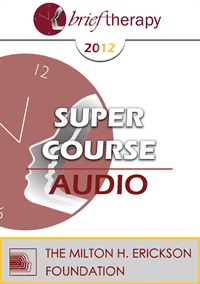
- Average Rating:
- Not yet rated
- Topic Areas:
- Attachment | Neuroscience | Super Courses | Intimacy | Differentiation | Couples Therapy
- Categories:
- Brief Therapy Conference | Brief Therapy Conference 2012 | Pioneers in Couples and Family Therapy
- Faculty:
- Ellyn Bader, PhD
- Duration:
- 1:51:57
- Format:
- Audio Only
- Original Program Date:
- Dec 09, 2012
- Short Description:
- Learn advanced techniques for understanding relationship dynamics, addressing communication challenges, and supporting couples through complex emotional landscapes. Explore attachment styles, therapeutic interventions, and strategies for helping couples navigate conflict, addiction, and personal growth.
- Price:
- $15.00 - Base Price

- Average Rating:
- Not yet rated
- Topic Areas:
- Family Therapy | Topical Panels | Neuroscience | Brief Therapy
- Categories:
- Brief Therapy Conference | Brief Therapy Conference 2012 | Pioneers in Couples and Family Therapy
- Faculty:
- Ellyn Bader, PhD | Camillo Loriedo, MD, PhD | Esther Perel, MA, LMFT | Frank Dattilio, PhD, ABPP
- Duration:
- 1:02:20
- Format:
- Audio Only
- Original Program Date:
- Dec 07, 2012
- Short Description:
- Experts explore innovative techniques for working with couples and families, combining cognitive-behavioral methods, systems thinking, and cultural sensitivity to address relationship challenges effectively. Learn strategies for identifying motivation, navigating cultural differences, and creating meaningful therapeutic interventions.
- Price:
- $15.00 - Base Price
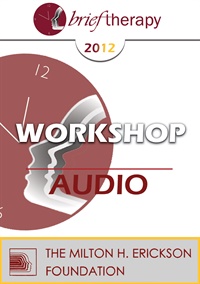
- Average Rating:
- Not yet rated
- Topic Areas:
- Neuroscience | Psychotherapy | Workshops
- Categories:
- Brief Therapy Conference | Brief Therapy Conference 2012
- Faculty:
- Ernest Rossi, PhD
- Duration:
- 2:42:36
- Format:
- Audio Only
- Original Program Date:
- Dec 06, 2012
- Short Description:
- BT12 Workshop 02 – Practicing the New Neuroscience of Psychotherapy – Ernest Rossi, PhD Group and individual demonstrations of Rossi’s new Activity-Dependent Approaches to the 4-stage creative process for optimizing of gene expression, brain plasticity, problem solving and mind-body healing. Practical approaches for all the psychotherapies as presented in Rossi’s 2012 book, Creating Consciousness: How Therapists can Facilitate Wonder, Wisdom, Beauty, and Truth.
- Price:
- $15.00 - Base Price
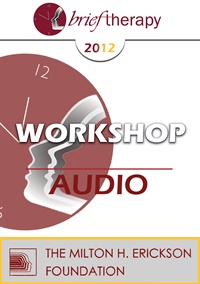
- Average Rating:
- Not yet rated
- Topic Areas:
- Consciousness | Neuroscience | Psychotherapy | Workshops | Four-Stage Creative Process | Self-Care | Therapist Development
- Categories:
- Brief Therapy Conference | Brief Therapy Conference 2012
- Faculty:
- Ernest Rossi, PhD
- Duration:
- 2:43:56
- Format:
- Audio Only
- Original Program Date:
- Dec 08, 2012
- Short Description:
- Neuroscience documents how experiences of (1) Novelty, (2) Environmental Enrichment, and (3) Mental & Physical Exercise can optimize gene expression, brain plasticity (brain growth), and mind-body healing. We will practice psychotherapy as discussed in my recent book Creating Consciousness: How Therapists can Facilitate Wonder, Wisdom, Beauty, and Truth.
- Price:
- $15.00 - Base Price
- Average Rating:
- Not yet rated
- Topic Areas:
- Clinical Demonstrations | Anxiety | Depression | Trauma | Neuroscience | Brief Therapy
- Categories:
- Brief Therapy Conference | Brief Therapy Conference 2014
- Faculty:
- Ernest Rossi, PhD
- Course Levels:
- Master Degree or Higher in Health-Related Field
- Duration:
- 58:34
- Format:
- Audio and Video
- Original Program Date:
- Dec 13, 2014
- Short Description:
- Group and individual demonstrations of psychosocial genomics as the art and science of counseling and psychotherapy that utilizes our natural 4-stage creative cycle for facilitating gene expression and brain plasticity to optimize the resolution of anxiety, depression, trauma and problem solving in everyday life.
- Price:
-
Sale is $29.00
price reduced from Base Price - $59.00


